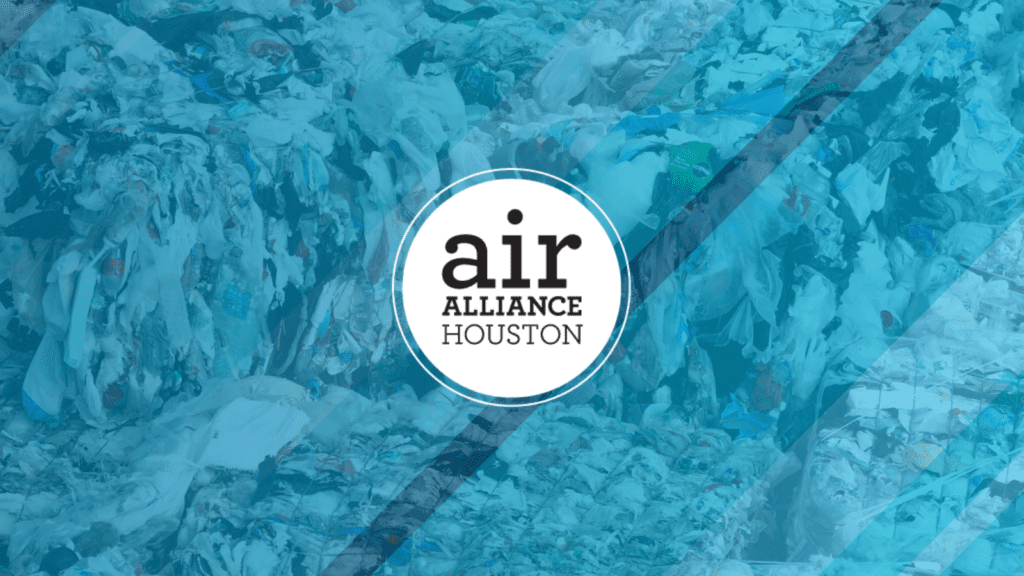Co-Authored

Brandy Deason
Climate Justice Coordinator (Plastic Pollution)

Cassandra Casados-Klein
Communications Manager
The production, use and destruction of plastic emits climate change-causing greenhouse gases and health-harming air toxics. Our Houston Ship Channel is lined with facilities creating and destroying plastics, all the while leaching harmful air toxics into the fenceline communities living nearby and working at these industrial facilities.
In early December in Busan, South Korea the United Nations met with the intention to create a global, legally binding treaty to address global plastic pollution.
The talks were stymied by a wide gap in opinions between delegations from small, often developing nations and the world's more advanced economies — along with some major global corporations and business lobbies whose presence was, in itself, controversial.
Duarte Dias, Tracy J. Wholf, CBS News
The group has committed to meeting again in 2025 in hopes to finalise a strong treaty. As these global deliberations are delayed, the Houston area must consider our own relationship with the plastics industry.
What is happening in Houston?
Is recycling a solution?
In the United States, the recycling rate for plastic waste plummeted to a mere 4 to 6 percent in 2021. Despite nearly four decades of efforts, the global recycling rate for plastics has never surpassed 10 percent.
…The reason? The production of new plastics remains significantly cheaper due to the complexities involved in sorting the myriad types of plastics by resin number and color prior to processing.
Unlike materials such as glass and aluminum, which can be recycled indefinitely, plastics have a limited lifecycle. They can only be recycled a few times before their quality deteriorates beyond usability.
RECYCLING METHODS, including pyrolysis, gasification, and solvolysis, emit toxins and are marketed as “chemical recycling,” “advanced recycling,” and “molecular recycling.” These processes are expensive, energy intensive, can emit air toxics and can use hazardous chemicals. Still, these ‘solutions’ could only take care of a small percentage of plastic waste.
Instead of relying on unproven, harmful solutions we need real action: reducing the production of plastics at the source, supporting policies to reduce the consumer’s dependence on plastic and removing subsidies on the oil and gas industries to produce plastic.
How does plastic contribute to poor air quality and damage our bodies?
Microplastics are tiny (less than .2 inches in length) bits of plastic that are small enough to be swallowed or inhaled. Like Particulate Matter, when inhaled, microplastics can damage the organs they come in contact with.
Depending on their purpose, plastics are made using different chemicals, many of which can interfere with the body’s endocrine system. These endocrine disruptors can lead to serious health problems like cancer and reproductive disorders. Microplastics can also pick up substances like heavy metals from the environment. Breathing in microplastics over time, even in small amounts, may also increase the risk of lung and heart diseases, depending on a person’s health and the type of particles they are exposed to.
What is Air Alliance Houston doing?
Today, Air Alliance Houston is organizing around the City of Houston Memorandum of Understanding that created the Houston Recycling Collaboration. This project has promised to increase our plastic recycling from less than 10% to 90%, but we know that recycling the myriad of plastics produced is close to impossible. We also know that the method they are proposing to use – so-called “advanced” or ““chemical recycling” methods – produces air toxics as a by-product.
How can I get involved?
Get involved as a community member: Join our Facebook group Houston is NOT Disposable. As part of our vision for clean air, every day for everyone, you will not only campaign against industrial pollution but also learn practical ways to minimize plastic usage in your daily lives. You’ll also be the first to know when there’s an opportunity to make a difference.
Get your organization involved: Air Alliance Houston is the founder and facilitator of the Houston Coalition Against Chemical Recycling (H-CACR). If your organization would like to join other like-minded groups in Houston to push back against this polluting technology, reach out to us at [email protected]. The Coalition meets virtually every other month
Air Alliance Houston is a proud member of the Break Free From Plastics Movement and the Beyond Plastics campaign.

